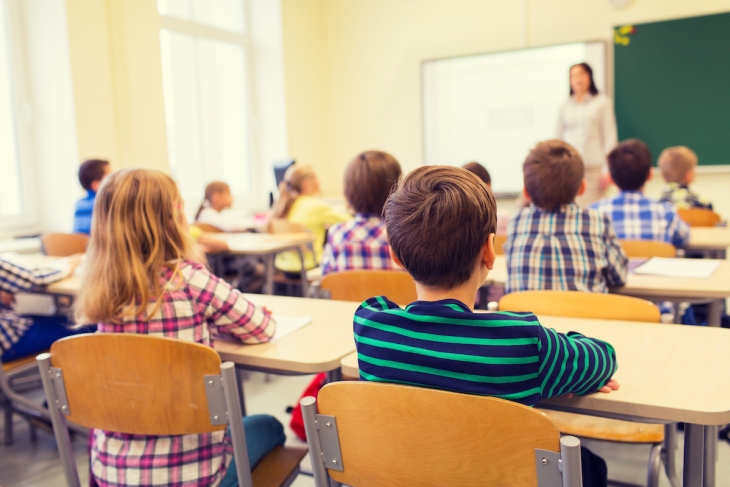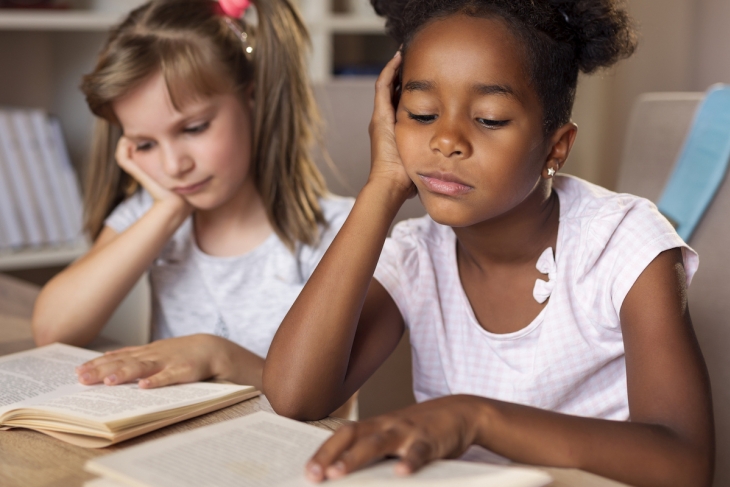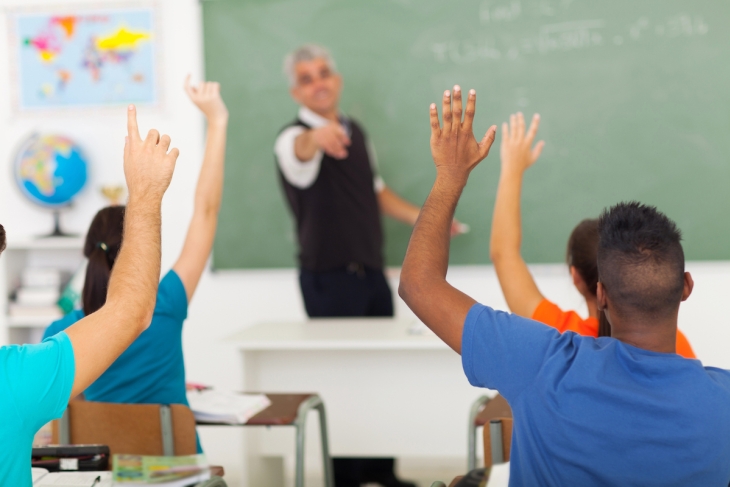Text to follow--check back soon!
A student was arrested after an attempted stabbing at Montgomery Blair High School. That same district has seen forty-eight fights already this year, more than the entirety of the 2018–19 school year. Not an isolated incident, data from the National Association of School Resource Officers suggests that this trend of increased school disorder extends across the country.
Before the pandemic began and critical race theory took center stage, debates over school discipline dominated the discourse. These discussions began after then-President Barack Obama issued non-binding guidance for schools to avoid discipline disparities between Black and White students. In response, many districts curtailed their use. Discussions grew more heated after Trump rescinded the guidance in 2018 and the death of George Floyd pushed racial disparities to the forefront of American discourse. The pandemic put these policy debates on hold. But with students back in buildings—after eighteen months of who knows what—it’s time to begin them again.
The slogan “defund the police” has found its way to the bin, but a similar upheaval is going on in public education. Between 2012 to 2016, suspension rates for students across the nation dropped, and states like California have outright banned suspensions for low-level defiance. In their place, districts and administrations have often put SEL programs and restorative justice practices—an alternative system of consequences to typical punitive practices—to manage misbehavior. The causes of the increased disorder are near impossible to pin down, but removing suspensions as a policy is certainly not the proper response.
The research on the topic is murky. Most arguments against suspensions focus on two issues: their link to lowered academic performance and the disparate rates of punishment between Black and White students. From there, these effects lead to a higher likelihood of incarceration, thus contributing to the “school-to-prison-pipeline”—or so runs the argument.
Regarding the first contention, the bulk of research has only determined a correlational link between these two. In fact, when one working paper from the University of Arkansas attempted to isolate the causal relationship—comparing suspended students to “otherwise similar” students—they found a positive relationship between suspension and grades. Similar behaviors caused both poor grades and suspensions; suspensions did not cause poor grades. Shooting spitballs and whispering to classmates are bad for both grades and behavior records. The researchers still find other reasons to justify the reduction of suspensions but suggest that we “should not expect academic gains to follow.”
Regarding the disparate rates of punishment between Black and White students, it’s necessary to compare the effects of suspensions to the unintended consequences of their removal. If the side-effects are worse than the disease, we need to find another cure.
There are district-wide case studies that provide useful insight. Philadelphia rolled back their use of suspensions in 2012–13, and the findings from one academic review are concerning. Reading and math scores plummeted, truancy increased, and the occurrences of violent crime spiked. Ironically, students ended up spending more time suspended because they received fewer suspensions but for worse infractions, thereby garnering longer punishments. Similar results arose in New York and California.
Another study followed the results of quarterly achievement tests in both math and English and compared them to suspensions in the school. It concluded that suspensions improved math scores for non-suspended students. In a simple pro-con analysis, Amber Northern, senior vice president for research here at the Fordham Institute, summarized the results: “The aggregate positive effects of peer suspension on non-suspended peers could well be greater than the aggregate negative effects on suspended students.”
Perhaps these dismal showings only occur when suspensions are banned without replacement with another system. One randomized-controlled trial from the RAND Corporation stymies that contention. With the implementation of restorative justice practices, disparities in suspension rates did, in fact, drop. Alongside that, however, came an uptick in misbehavior, classroom disruption, and bullying. I’ve taught in such a building. Suspensions rates dropped, but only because teachers stopped reporting behavior. If anything, as the study implies, behavior worsened.
No person of good conscience who is familiar with America’s racial history is likely to be satisfied by observed disparities in suspensions. Even so, the existence of a problem does not itself justify any one solution. Thomas Sowell famously quipped that “there are no solutions, only trade-offs.” In this case, the trade-offs are dire. In seeking to solve one problem, we create a school environment in opposition to learning. In fact, these side-effects often disproportionately affect Black students. Returning to the opening counter-arguments, if lower academic performance and increased suspensions do lead to a “school-to-prison pipeline,” outright suspension bans seem like a policy to worsen that system.
Study after study has found that suspension bans often make the problems they are meant to solve worse, but that doesn’t mean there is nothing to be done. There are things to be learned from restorative practices, even if they are not adopted wholesale. Consider Michaela School in London, which has a reputation for being one of the strictest schools in England. Despite the use of punitive discipline, teachers meet with children after a consequence to have a restorative conversation. They adopt certain elements of restorative justice while also maintaining clear systems of behavioral expectations, consequences, and rewards. This conversation is not simply either-or. Doing both could be better than doing either in isolation.
Order, routine, authority, consequence: These are not dirty words, especially if you’ve experienced the alternatives. When we remove teacher authority from schools, some utopian sharing of power among teachers and students does not result.
Facing disparities, American schools certainly need some sort of disciplinary reform. Suspensions must be used judiciously and paired with instructional reform and student support. There is certainly a litany of alternative options, restorative justice being one. But until any prove effective, suspensions remain a necessary tool.
Editor’s note: This was first published by Newsweek.
Teachers are frequently reminded during their careers to “meet the students where they are.” It’s a common-sense idea: There are things students know and can do today, and other things they should be able to do eventually. In between is the sweet spot for learning and growth. Going too far outside students’ current comfort zone is a recipe for frustration.
What’s true of teaching is also true of politics. Voters have ideas they currently favor, and others they might someday adopt. But as Democrats learned the hard way in Virginia earlier this month, both won’t happen all at once. So long as they continue to misunderstand America’s relationship with its schools, Democrats are unlikely to gain the upper hand on education anytime soon.
Here’s the thing: Education is inherently “progressive.” At least in principle, it’s an engine of social progress, fairness, and upward mobility. It’s closer to Robert F. Kennedy–style progressivism than the radical views of “The Squad,” but education aligns with the outlook and goals of multi-racial, working-class progressivism.
But while education is progressive, school is inherently conservative. Schools are hyperlocal institutions that tend to valorize tradition, order, and norms, which are all “conservative” virtues. This paradox—education is progressive, and schools are conservative—lies at the heart of public education in America, and currently plays to the advantage of Republicans.
It’s a common observation—often a complaint—that the basic structure of school hasn’t changed in centuries. Kids sit at desks, teachers stand in front of the room, and the academic diet leans heavily on the best that has been discovered, thought, and created: our language, literature, history, scientific discoveries, and artistic achievements. This default mode is by definition culturally “conservative.” If this basic playbook hasn’t changed in centuries, it’s because we have resisted disrupting it. It’s an enduring cultural habit that still resonates with a majority of Americans.
Today’s progressives, by sharp contrast, have never met an institution they didn’t want to upend. They do not see or appreciate the role Americans have assigned to schools. As data scientist and Democratic wunderkind David Shor has noted, the party is dominated by elite, ideologically committed young staffers. Their policy preferences do not meet the voters where they are—at least not moderate voters with strong ties to local schools.
This disconnect is not limited to angry White suburban mothers, the group being scapegoated for the Democrats’ poor showing in Virginia and New Jersey. Stephanie Saroki de Garcia—the cofounder and managing director of Seton Education Partners, which operates schools exclusively in low-income Black and Brown neighborhoods—recently revealed, “We have not had a single one of the parents of our 5,000 students that we’re serving saying, ‘We want you to do more of this antiracist work.’” Parents prize safety, academics, and character formation. Privately, the leaders of ostensibly “woke” charter schools echo and amplify Saroki’s observation. But they have the same problem as the Democrats: a need to hold on to the young, ideologically committed “base” who staff their schools.
Americans have long given poor marks to public education at large, but they reliably give “A’s” and “B’s” to their own child’s school. This is not a paradox. Education is an abstraction; school is a familiar place. Parents want to assume that their local public school is safe, reliable, and available—and that it will adequately prepare their children for college, the workplace, or other opportunities. Belief in this progression drives parents’ resistance to anyone trying to tinker too much with the formula.
In the final days of his failed campaign, Terry McAuliffe brought in teachers union president Randi Weingarten to make a final pitch to parents—to the delight of Republicans. The Democrat seemed unaware of Weingarten’s status as the person most blamed, fairly or not, for keeping schools closed. Days earlier, he campaigned with former president Barack Obama, who insisted, “We don’t have time to waste on phony culture wars or fake outrage that the right-wing media is peddling.” Another tone-deaf swing and miss: A school is nothing if not a cultural institution. By their very nature, schools are better suited to reflect and reinforce the existing social contract than to challenge it.
The Virginia results suggest that Democrats have two options on education. The first is to listen to parents, take a cue from teachers, and meet the voters where they are. The second option is simpler: lose more elections.
We are back from last week’s Thanksgiving break and covering news stories from 11/19/21 – 12/3/21.
Supporting “our entire family of schools”
Indianapolis’ Board of School commissioners voted on November 18 to approve a proposal to share referendum funds with the charter schools in their portfolio. While the amount per student is less than a third of what traditional district schools receive from the same source, charter operators in Indy are welcoming both the infusion of funding and the collaborative relationship the vote represents.
A new choice for northeast Ohio students
New Story School is a charter designed to serve students with autism, emotional needs, and various behavior issues from ages 5 to 21. Cleveland.com covered the development and operation of the school, which will open its doors in the Cleveland suburb of Independence in January.
New charter high school in the planning stages in Columbus
If all goes well, Educational Solutions plans to expand their offerings in Columbus to include a charter high school. There are some potential zoning hurdles standing in the way of their proposed location for now, but at least one influential member of the Northland Community Council is vocally supportive.
The right to a good school?
Wall Street Journal columnist Andy Kessler last week covered a non-profit group’s efforts to enshrine families’ right to a high-quality education in the California state constitution. It is likely an uphill battle, and success is anything but a foregone conclusion, but the issues under debate are essential.
Huge news
Earlier this week, Bloomberg Philanthropies announced it was launching a five-year, $750 million effort to support charter schools across the country. While many details are still to be announced—including which other cities will benefit besides founder Michael Bloomberg’s home of New York City—the goal is to add 150,000 new seats for students. Grants will be awarded to new and existing nonprofit, non-virtual charter schools; provide funding to launch new models; support efforts to create more racial diversity among charter teachers and leaders; and to build and upgrade facilities.
*****
Did you know you can have every edition of the Ohio Charter News Weekly sent directly to your Inbox? Subscribe by clicking here.
- There are only two times when school report cards are deemed correct by school district officials: the first is when they show traditional district schools doing well (and specifically when districts, like Talawanda City Schools in this piece, are faring better than their regional sports rivals). The second one, well…you know. (The Journal-News, 12/2/21)
- Here in Columbus, Educational Solutions has big plans to expand their charter school offerings, adding a high school in response to parental requests. Local news coverage suggests there are some potential zoning hurdles to overcome regarding their preferred location, but at least one influential member of the Northland Community Council is vocally supportive of the move. Fingers crossed! (ThisWeek News, 12/2/21)
- Tis the season for districts to release their five year fiscal forecasts, as we have noted in these clips a few times in recent weeks. Tis also the season, unfortunately, for some questionable on-the-record statements in regard to those forecasts. First up today, dire financial trouble was predicted in Lorain City Schools if their November levy didn’t pass. Less than a month from the defeat of that levy, the district forecast is sunny through almost the entirety of the five year window. Why? Increased student enrollment. While the piece throws a little shade on whether the district CEO and elected school board members knew this information prior to Election Day, that issue really seems immaterial to me at this point. Students are returning to Lorain City Schools, despite everything they’ve experienced over the last four years. That’s the big news, but no one seems to know why. The theories put forward by folks on the payroll, however, are many and varied. And hilarious. (The Chronicle, 12/1/21)
- Even more troubling, the five-year budget forecast for the Adams County Ohio Valley School District appears to be predicated on the treasurer’s political prognostications. The stream-of-consciousness reportage in this piece is hard to slog through, but the gist is that there is some solid bad news on revenue loss and rising expenses in the near term. But, if they just tighten their belts a little now, “In year three of the forecast, in my opinion, we will probably have a new governor, which means there could be a new school funding formula”. And the future will take care of itself from there. (People’s Defender, 12/2/21)
Did you know you can have every edition of Gadfly Bites sent directly to your Inbox? Subscribe by clicking here.
Education for high achievers has come under siege in blue cities and states as the national focus has shifted to racial equity in the aftermath of George Floyd’s murder. But such attacks, even when well-intentioned, are misguided. They target a problem’s symptom rather than its cause, and in doing so, harm students and defy parents. Such efforts are also politically unwise, as seen by backlashes in purplish places like Virginia and Democratic strongholds like New York City.
Examples of this opposition to gifted and talented education are everywhere. The California Department of Education has urged schools to abandon accelerated math before tenth grade. New York’s mayor announced plans to dismantle K–5 gifted programs. Boston relaxed admissions to its selective high schools, while top-rated Thomas Jefferson High School in Fairfax County, Virginia, scrapped its entrance exam entirely. The list goes on.
Driving many of these efforts is a desire to make such programs and the opportunities they provide more racially equitable. Also visible is a brand of antiracism associated with writers like Ibram X. Kendi that can view racial disparity as de facto evidence of racism. “We want the program just abolished. Period,” said Rita Green, the education chair of the Seattle Chapter of the NAACP, regarding K–5 gifted services in her city’s public schools. “It is fundamentally flawed, and it’s inherently racist.” Similarly, Donna Ford, who focuses on multicultural gifted education at Vanderbilt University, said that highly-selective Thomas Jefferson High School was “practicing discrimination” because its racial makeup didn’t match that of the county in which it’s located.
There’s no denying that many of these programs have a diversity problem—but they didn’t cause it. The primary issue is that U.S. communities have long done a poor job of maximizing the potential of students in low-income neighborhoods that are predominantly Black and Hispanic—regardless of the children’s ability. Not only do they suffer from poverty, they have less access to healthcare, healthy food, safe streets, early childhood education, and much more. And when they do attend school, it’s too often in buildings full of inexperienced teachers who are frustrated by hulking bureaucracies and more likely to transfer or quit. In those buildings, they sit in crowded and unruly classrooms lacking in quality instructional materials, school supplies, and technology. The disadvantages go on. But the takeaway is simple: We make it far too difficult for these children to succeed.
When done well, education programs designed for high achievers actually help counteract these challenges. Nobel laureate David Card and his colleague Laura Giuliano, for example, studied such a program in a large urban district. Students who earned top scores on a statewide achievement test, when compared to peers in their schools, were placed into separate gifted classrooms. This policy for identifying gifted students, commonly known as using “local norms,” increases diversity because it doesn’t force students in lower-income schools to compete for artificially-scarce spots with more advantaged peers who attend other schools in the district. Card and Giuliano found that these separate classrooms produced “significant gains in reading and math, concentrated among lower-income and Black and Hispanic students.” Take such programs away, and those gains for these children disappear.
Parents recognize this, too. Eight-three percent of moms and dads think, for instance, that it’s appropriate to use test results “to determine whether a student should be eligible to enroll in a special academic program,” according to a survey conducted by Phi Delta Kappan last year. And many oppose efforts by leaders and politicians to scrap such practices and the programs they help select for.
After the 2020 election, Jay Caspian Kang, a staff writer at the New York Times, wrote a piece titled “‘People of Color’ Do Not Belong to the Democratic Party.” In it, he discussed how Hispanic and Asian American voters had swung toward the Republican party. This November, in the Times, Kang stood by this assessment: “What I argued then, and I continue to think today, is that anyone who actually spends any amount of time in these ethnic enclaves or bothers to talk to immigrant parents could have seen this coming.” These voters, he added, might see the Democrats’ “egalitarianism as anathema to both their American dream and the pathways to success for their children.” And after years of covering this issue, he concluded that one of the “most important issues in [Asian American] communities” is “so-called merit-based educational issues like admissions tests for top schools.”
The political salience of such issues was evident last month in Virginia’s much-covered governor’s race, in which Republican Glenn Youngkin overcame polling deficits to defeat popular Democrat Terry McAuliffe. As Kang also mentions in the Times, Youngkin strategist Jeff Roe said to Politico, “One of our first advertising pieces in the general election—and one of the first things we hammered on—was that the Thomas Jefferson School in Northern Virginia had lowered their academic standards.” The campaign recognized that parents care about this. And if strong pushback against similar changes in New York City, Boston, and California is any indication, Youngkin’s team was right.
The parents are right, too. Education programs for high achievers work. Done right, they give participating students—including those who are Black, Hispanic, and low-income—years of increased academic rigor and enrichment. This better prepares them to gain acceptance to, and excel at, selective high schools and colleges, where they earn degrees that make them competitive for respected and lucrative careers.
Politicians and policy leaders, particularly those in Democratic states and cities, should therefore resist pressure to abolish or weaken these programs in the name of equity. They should heed the evidence, listen to parents, and recognize that scrapping these services will cause more harm, not less, to students of color.
Once a year, parents of young children can look forward to their kids coming home from school with turkeys drawn by hand and heartwarming lists of what they are grateful for, with loving parents and helpful teachers usually at the top of the list. This happens just before families pack up and travel to be together and give thanks for all the blessings of the year. The fact that we have a federal holiday dedicated to a day of gratitude is perhaps itself an argument that there is at least one virtue that Americans can agree is valuable enough to be taught, encouraged, and celebrated. However, just as one swallow does not make a summer day, one day of giving thanks is not sufficient to cultivate a virtue in children. Gratitude is a virtue that should not only be celebrated every year at Thanksgiving, but also taught and reinforced every day in our schools.
Gratitude is a personal virtue that is often understood as a part of justice. Justice is the virtue that governs our outward actions, making sure that they render to others what is owed to them. Gratitude, or giving thanks, is, in an important sense, about rendering what is owed, specifically to a benefactor or bestower of some gift or favor. St. Thomas Aquinas argues that, when someone gives a gift to another, a debt of gratitude arises that the recipient of the gift must pay back with gratitude, which should be offered in a spirit of honor and reverence towards the benefactor.
Gratitude is a virtue that strikes a mean between two extremes: feeling entitled to the gift on the one hand and feeling unworthy of a gift on the other. Gratitude is chiefly a matter of feeling thankful for the gift received. In fact, Aquinas, in his discussion of gratitude, quotes Seneca approvingly, who argues that whoever receives a gift or favor with gratitude in his heart has already begun to pay it back. Seneca further argues that we can show our gratitude by “the outpourings of our heart” and by showing our benefactors reverence and honor.
What we can offer in thanksgiving depends on our resources and our abilities, and it takes good judgment to see when proper gratitude is owed and how it can be offered. In our schools, we should encourage gratitude both as a matter of feeling and a form of action. Beginning at an early age, we can talk about how to identify the gifts we have been given and the value of giving thanks and modeling appropriate ways to do this with one another. We can encourage young children to be grateful to their parents for making them dinner, and to think of ways they can express their gratitude for a homecooked meal (e.g., helping to clean up the table, sweeping the floor, etc.). We can introduce them to stories where gratitude is a theme and give them concrete historical examples of acts of gratitude that they can understand and imitate.
As children get older, we can have them keep a gratitude journal, where they are prompted to reflect upon gifts they have received in their lives and ways they can repay the debt of gratitude they have incurred from others. We should model and encourage creativity about expressions of gratitude, keying them to the individual strengths and abilities of our students. And of course, we should encourage students to think of ways that they are indebted to one another at school and how to express gratitude to classmates, teachers, and friends. Writing letters of gratitude is one proven way to cultivate this disposition in students.
Gratitude is important because it helps us see all the ways that we depend on others in our lives. In this way, it is connected to humility—of having appropriate self-regard, one that is in tune with the fact that our successes are never entirely our own. Gratitude encourages us to reflect on the gifted aspects of our lives, and to cultivate the sense that we need to pay back debts of gratitude according to our means and abilities, and to be creative in how we think about how to express our gratitude, not just to other persons, but also to the institutions that have profoundly shaped our lives and livelihoods.
Empirical work on gratitude strongly suggests that its cultivation has many benefits, including greater health and psychological well-being. This wealth of research suggests that grateful people are generally happier, more satisfied with their lives, less materialistic, and less likely to suffer from burnout. There is also research suggesting that the cultivation of gratitude encourages the development of other virtues, including humility, patience, and wisdom. Studies on children suggest that gratitude enables them to be more socially integrated and happier in school, as well as see improvements in mood and the development of pro-social behavior.
While I am happy that America’s schoolchildren are taught to be grateful once a year, gratitude should be a part of our curriculum throughout the year because it is at the heart of flourishing students, schools, and communities.
I’m a rather dreadful cook. Nonetheless, in the summer, with easy access to farm-fresh vegetables and the internet’s profusion of recipes, my wan table occasionally turns into something resembling a feast. And this phenomenon works in reverse. Even the best of chefs, faced with a cabinet of prepackaged dinners and frozen vegetables, could muster only mediocrity—better than the rest of us, but no Michelin-star course.
And so it is with school curricula. Give teachers skimpy books and instructional materials, and that’s how their classrooms will run. I’ve used bad curricula before and spent hours building my own—both with mixed results. Doug Lemov’s Teach like a Champion team has done us all the favor of providing top-quality materials called the Reading Reconsidered Curriculum, and this year I have had the privilege of using it.
I noticed its benefit most while teaching Frederick Douglass’s autobiography. It depicts in graphic detail the horrors of American slavery. The book opens with a whipping and several murders. Handling these scenes with care is essential, and I had misgivings about my responsibility to manage this well with my students. But I knew this unit had questions crafted, revised, and edited by fellow educators. I could rely on a team, not just myself. My class had the expertise of curriculum developers and workshopped questions helping us through difficult content.
Yet I never felt constrained. A few days after my students analyzed these difficult scenes, I could tell they were still struggling, so I sat with them and asked how they were doing with the book. It led to an impromptu forty-five-minute discussion that was one of the best of my career. It veered away from the official unit, yes, but the knowledge building, question asking, and analysis of the official curricular documents allowed it. We could not have feasted on such conversation without the content the curriculum had provided.
The necessity of a sequenced, knowledge-rich curriculum has been thoroughly defended elsewhere. E.D. Hirsch, Jr., founder of the Core Knowledge Foundation and professor emeritus at the University of Virginia, has spent much of his long career explicating the importance of knowledge to reading achievement. Consider how even American academics who fancy themselves proficient readers may stumble through a passage on cricket because they know nothing about the game. It’s their knowledge deficit on this topic, not any abstract reading skill, that prevents them from understanding the passage. Hirsch has also documented the prevalence of core curricula among the world’s best education systems. Building a broad schema of knowledge facilitates reading achievement, not just practicing vague, abstract comprehension skills.
While I’ve become a proponent of Hirsch’s theories, it has been difficult to put them into practice by myself. What does a knowledge-rich theory of education mean for my day-to-day instruction? Previously, Lemov has published best-selling books like Reading Reconsidered and Teach like a Champion to distill the theory. Even so, Lemov himself has acknowledged that “useful ideas” can be difficult to “implement in practice.” Teachers spend up to seven hours a week developing their own resources—time they could otherwise spend providing feedback, communicating with parents, grading, or reflecting on their practice.
I noticed this time-saving most when it came to non-fiction, supplementary texts. Such auxiliary readings serve two purposes in a class. First, knowing more about a topic can help students better understand and analyze a book. They need to know about fugitive slave laws, for example, to grasp Douglass’s cause for anxiety upon reaching the north. It also turns any unit into a knowledge-building machine, as the book and supplementary texts provide history, background information, and analysis that they can they use in future classes.
Lemov’s unit is filled with myriad additional texts: excerpts from biographies, primary texts, maps, pictures, engravings, articles from the time period, and much more. Again, through the expertise of the curriculum planning team, my students had access to content and readings that I never would have thought to include in a unit crafted by myself, not necessarily due to my own limits, but because of the sheer abundance of expertise that an entire team brings to the table. Regarding the time saved, it is tedious to find relevant texts, pare the long ones down, and write the perfect comprehension and connecting questions for student analysis.
A common argument against knowledge-rich curricula and Direct Instruction classrooms caricatures the role of a teacher in such a structure as a mere automaton, a vessel that transmits the pre-ordained content. At no point did I feel this way. If anything, it merely felt like I had a team of colleagues providing insight, materials, ideas, activities, and readings, a feast for my students to enjoy. And enjoy they did.
In 2012, Tennessee lawmakers created the Statewide Dual-Credit program (SDC) to help more students earn college credit while completing high school. SDC was meant to provide a new set of accelerated course options to reach students typically missed by traditional college-preparatory Advanced Placement (AP) courses or dual enrollment (DE) classes taken on college campuses and taught by professors. It was designed to appeal particularly to those interested in applied and technical fields and likely to pursue two-year college degrees or postsecondary technical programs. A new study in the journal Educational Evaluation and Policy Analysis looks at the rollout of and participation in the program, as well as effects on AP offerings.
SDC course topics were chosen by representatives from the University of Tennessee system, the board of regents, and the state department of education. They were meant to be attractive and practical, with consideration to workforce demand, existing postsecondary pathways, and student interest. Teams of high school and college instructors designed the courses, aligned to Tennessee Transfer Pathway standards. Ten courses were created at the outset: statistics, pre-calculus, world history, sociology, psychology, criminal justice, plant science, agricultural business, college algebra, and health information technology. (The latter two were discontinued during the study period.) No GPA or course prerequisites were required for enrollment; high schools were allowed to use their own judgment about students’ readiness. SDC courses were taught in high schools by teachers who completed specific training provided by the state. Students earned college credits by passing end-of-course exams, a more rigorous requirement than some dual enrollment programs and more akin to AP.
The researchers looked at data from 2009 to 2017, covering four school years before and four school years after the launch of SDC. School-level analyses include 324 buildings across Tennessee that serve both eleventh and twelfth graders. Student-level analyses covered 100,000 eleventh and twelfth graders.
Overall, 48 percent of schools offered at least one SDC during the study period, ranging from 17 to 35 percent in any given year. The typical school offered just one course. By comparison, 76 percent of schools offered at least one AP course. Unfortunately, no data were available related to dual enrollment utilization at any point in the study period. Relative to statewide averages, schools with SDC and AP courses had higher student achievement and fewer disadvantaged students. However, SDC-offering schools had higher proportions of White students than average, whereas AP-offering schools did not. SDC schools were less likely than AP schools to be in urban areas. School size was the main predictor of offering SDC and AP courses—more kids, more college credit options.
Ninety-three percent of students who took an SDC took only one, which makes sense given the single course offering in a typical school. Relative to the average student, SDC takers were more likely to be White, higher achieving, and female. Relative to AP takers, SDC students were more likely to be White, but less likely to be female or high achieving. The courses deemed more “academic” in nature (math and sociology) attracted students with higher prior academic achievement compared to the career-tech-focused courses. Sociology and criminal justice SDCs attracted the most students of color while the students choosing agricultural business and plant science were almost entirely White.
Within schools, Black students were as likely to enroll in an SDC as their White peers, but were 3.8 percentage points less likely to enroll in an AP course. Hispanic students were as likely to enroll in both SDC and AP as their White peers. Students who participated in AP courses prior to SDC launch were more likely to continue on with AP rather than pick up an SDC; however, there was some evidence that SDC college algebra—wherever it was offered—served as a precursor to participation in AP math courses. Students were more likely to enroll in a career-tech-focused SDC if they had taken a related elective from the high school curriculum previously. The researchers suggest that elective requirements in Tennessee, into which the new SDCs were added, led to such a course-taking pattern. Offering SDCs did not appear to decrease AP offerings overall.
Unfortunately, student success in SDCs was extremely low during the timeframe under study. Just 3 percent of SDC students passed the criminal justice exam, while the highest pass rate, for the plant science exam, was just 35 percent. Evidence suggests that these low passing rates within schools were a factor in local officials’ decisions to discontinue their SDCs after a year or two. However, more than 78 percent of schools that discontinued the agricultural business SDC offered a traditional high school version of it the following year, indicating that student interest was not among those negative factors.
Thus, while the SDC plan achieved its initial goal of attracting a number of new and more diverse high schoolers into college-credit-bearing classes in Tennessee, some serious changes were likely in order if the overarching goal of increased postsecondary attainment was to be assisted by SDCs. The researchers discuss the possibility that either the teachers were underprepared to deliver the material at the high level required at the outset, or that these eleventh and twelfth graders were simply unprepared for college level coursework, no matter the format. The program remains alive in Tennessee and now offers eleven courses. But it seems inescapable that the road to postsecondary credential attainment starts long before students step foot in high school. Today’s underprepared third grader is tomorrow’s low-performing ninth grader. Without some foundational work, states are bound to struggle to “accelerate” college students who have not yet been taught up to high school proficiency, no matter how cleverly that acceleration is designed.
SOURCE: Steven W. Hemelt and Tom Swiderski, “College Comes to High School: Participation and Performance in Tennessee’s Innovative Wave of Dual-Credit Courses,” Educational Evaluation and Policy Analysis (November 2021).
In early November, the Code.org Advocacy Coalition, the Computer Science Teachers Association, and the Expanding Computing Education Pathways Alliance teamed up to release the 2021 State of Computer Science Education. It offers a plethora of national and state-level data on policy, access, and participation, which is important information given the growing prominence of computer science in society and the abundance of open jobs in the sector.
One key feature of this report is the nine policies it identifies as critical to expanding computer science education and ensuring that growth is both sustainable and equitable. States that adopt more of these policies tend to have more of their high schools offering computer science. Six states have adopted all nine policies—Alabama, Arkansas, Idaho, Indiana, Maryland, and Nevada. The policies are:
- Create a state plan for K–12 computer science.
- Define computer science and establish rigorous K–12 computer science standards.
- Allocate funding for computer science teacher professional learning.
- Implement clear certification pathways for computer science teachers.
- Create preservice programs in computer science at higher education institutions.
- Establish a computer science supervisor position in education agencies.
- Require that all high schools offer computer science.
- Allow a computer science credit to satisfy a core graduation requirement.
- Allow computer science to satisfy a higher education admission requirement.
Over the last year, a total of thirty-one states have adopted or revised their policies on computer science education. States allocated over $65 million for K–12 computer science education in FY 2022. All fifty states and the District of Columbia now allow computer science to count toward a graduation requirement, and three states—Arkansas, South Carolina, and Nevada—require it for graduation. A total of twenty-three states mandate that all their high schools must offer computer science courses.
To measure access and participation, the report focuses on schools that offer a foundational computer science course. This means the course is offered during the traditional school day and requires students to apply learned concepts through programming for at least twenty hours. Nationally, 51 percent of high schools offer such classes. That’s up from last year, but there are still some worrisome access disparities. For example, rural and urban schools are less likely to offer computer science than their suburban counterparts. Schools with high percentages of economically disadvantaged students are less likely to offer courses, and Black, Hispanic, and Native American/Alaskan students are less likely to attend schools that offer it.
Seventy-eight percent of high school students attend schools that offer foundational computer science, but within the thirty-seven states with enrollment data, just under 5 percent of students are actually enrolled in a course. One bright spot is participation in AP computer science, which has increased over the last several years and includes two courses: AP Computer Science A and AP Computer Science Principles. Even during the 2019–20 school year, when the number of exams given in most AP subjects decreased due to the pandemic, participation in AP computer science exams increased 13 percent. The number of female students and students from underrepresented racial and ethnic subgroups who are taking AP computer science exams has also increased, yet disparities remain. Black and Hispanic students only account for 6 and 16 percent of AP computer science exams, respectively.
The report also offers detailed summaries of policy, access, and participation within each state. For example, Fordham’s home state of Ohio has implemented six of the nine key policies. During 2019–20, half of the Buckeye State’s public high schools offered foundational computer science courses, up from 42 percent in 2018–19. In total, 65 percent of Ohio high school students attend schools that offer computer science. But there are gaps and disparities here, too: 67 percent of Ohio’s suburban schools offer foundational computer science, compared to 34 percent of urban schools and 48 percent of rural schools. Only 36 percent of schools where more than three quarters of the student body are eligible for subsidized lunches offer computer science, compared to nearly 50 percent of schools where fewer than a fourth of students are eligible. Black students are 1.7 times less likely than their White and Asian peers to attend a school that offers AP computer science. And only 26 percent of the AP computer science exams administered last year were taken by female students. These disparities can and should be addressed quickly, as Ohio has an average of 18,628 open computing jobs each month and these jobs offer an average salary of $86,842.
Finally, the report outlines four recommendations for leaders, educators, and advocates to expand participation in computer sciences. First, it’s important to ensure that opportunities are available to students from underrepresented populations. Second, states and schools should leverage students’ own devices, school broadband access, and educators’ increasing experience in teaching with technology. Third, schools should create K–12 pathways for computer science that will lay a foundation for more diverse enrollment and retention in high school courses. And fourth, school leaders should prioritize foundational computer science courses so that students are prepared for advanced pathways.
SOURCE: “2021 State of Computer Science Education: Accelerating Action through Advocacy,” Code.org, CSTA, and ECEP Alliance (November 2021).









